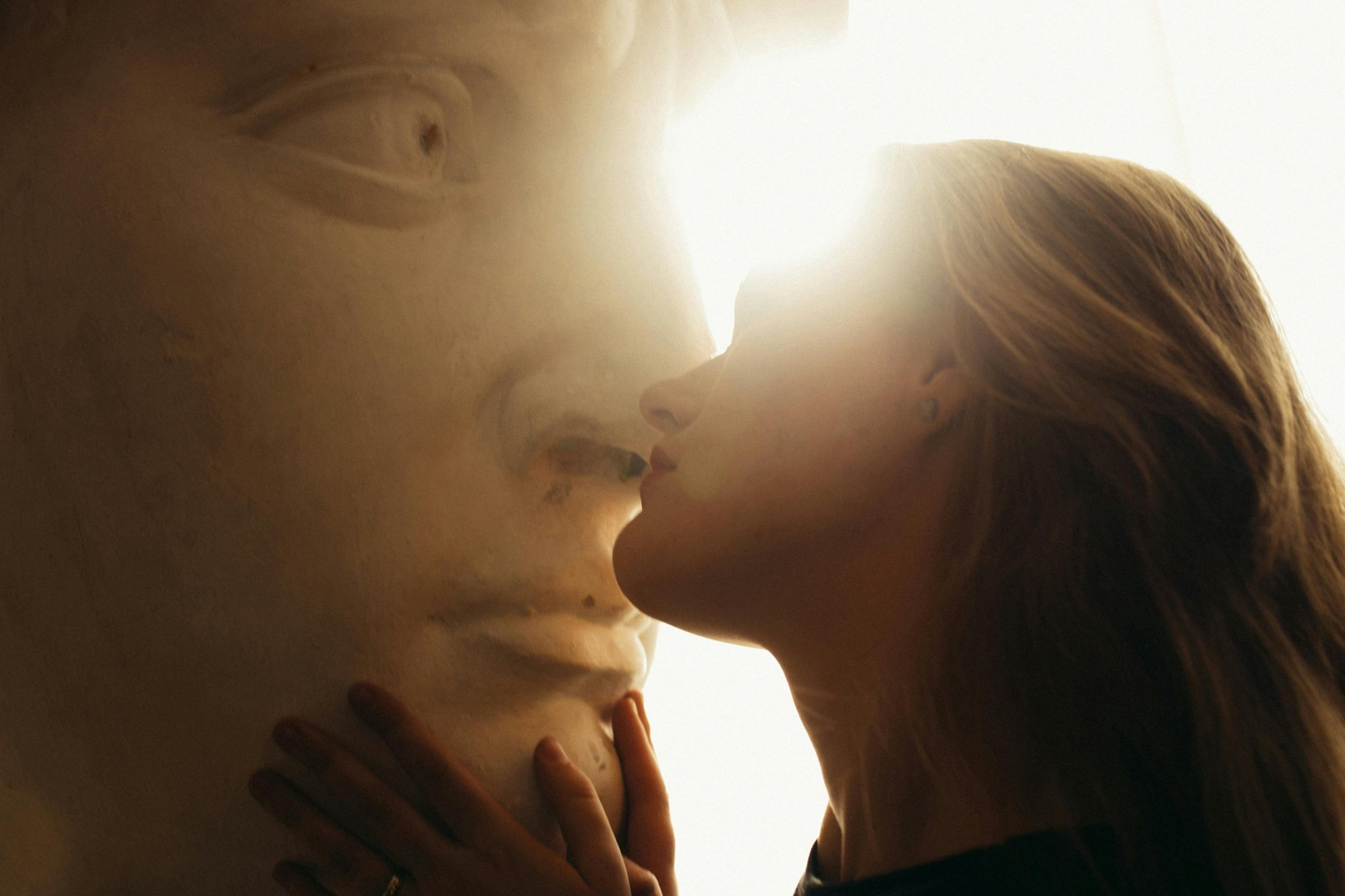‘ILY’ isn’t good enough. Fictosexuality has us wanting more – or is it less?
Fictosexuality – the attraction to fictional characters – is more than a trend. Charlie Elizabeth Culverhouse discovers the psychology behind the TikTok trend and its impact on modern relationships
The brooding Bridgerton brothers in their frilly white shirts, which have preferably been dampened by rain or a fall into a river; Dev Patel as the endearing David Copperfield, his top hat sitting over a mess of dark curls as he navigates Victorian society; Tom Hardy portraying Heathcliff in his questionable yet oddly attractive wig, crying while he begs his dead lover to ‘haunt me’ and ‘be with me always.’
Just the thought of it is enough to send you swooning.
It’s basically smut.
Well, for the folks of TikTok, it is.
“It’s always ILY and never [insert yearning declaration of love here],” TikTok complains. The most questionable I’ve stumbled across is an offer of ‘one hundred acres and two hundred sheep’ in return for a woman’s love, made by sheep farmer Gabriel Oak in the Victorian-set 2015 book-to-film adaptation Far From The Madding Crowd.
We can often easily decode an attraction to fictional characters; they have beautiful, symmetrical faces (Jacob Elordi as Felix in Saltburn, Heath Ledger in 10 Things I Hate About You, Zendaya in, well, anything); they speak in deliciously quotable sentences that no one could possibly come up with on the fly (Ryan Gosling in The Notebook); or they simply draw you in with an abundance of charm and cheeky behaviour (the list here could be quite literally endless.)
But when we’d rather be offered a farmstead than the longed-for words ‘I love you’, has fictosexuality gone a little too far?
Fictosexuality explained: emotional connection over physical attraction
Fictosexuality is an umbrella term, describing the attraction people feel towards fictional characters and it actually exists on the asexuality spectrum. And, as with all things on the spectrum, it can be experienced in degrees.
Jessica Hunt, a licensed psychotherapist with, she tells me, “more than a few book boyfriends” under her belt, explains: “For some people, the attraction to fictional characters is more about the emotional connection to the story and the character’s personality, rather than physical attraction.”
These asexual feelings, she says, add a new level of emotional fulfilment to someone's life, helping them to connect with both the experience of others and with a deeper love and appreciation for whichever media they’re consuming.
“For some people, the attraction to fictional characters is more about the emotional connection, rather than physical attraction”
But, for those who aren’t strictly asexual and don’t identify themselves as such, “There’s often a balance between the deep emotional connection they feel toward fictional characters and their desire for real-life intimacy,” Hunt says. Readers/watchers/listeners fall in love with characters for their personalities or looks as they would with another real, living human being.
But you can’t get further from real-life intimacy than falling for a fictional character, and especially those whose stories play out in historical settings. So why are these characters far more attractive than any real-life individual we could encounter in the modern day?
Why we choose fiction over real life: the rise of idealised romance
Hunt believes a lot of it is down to design. We’re meant to fall in love with these characters who are written as the “idealised romantic figures”.
She says: “We long for someone to see us as worthy of that intense, all-consuming love, the kind often dramatised in romantic fiction. These characters allow readers to imagine being wanted, seen, and chosen in a way that feels profound and unique.”
And it’s true, she admits, that this level of deep emotional intimacy – a love “that feels rare, passionate, and life-changing” – is not always on hand in the real world, meaning we turn to fiction to fill the void. It's not always a bad thing though, Hunt says, with fiction allowing people to explore relationships in a “safe, controlled, and emotionally fulfilling way, without the complications of real-world dynamics”.
Adam Lyons, a dating coach, psychology expert and founder of Ask the Dating Coach, thinks it’s not so much about the character as it is the historical setting they’re in.
“It is the fantasy of going back to a time where things seem simpler,” he says, alluding to the many reasons given for romanticised aesthetics like cottagecore making their modern day revivals too.
We know that the reality for women was different to the portrayals we see in these historical fictions but, Lyons explains: “With these stories, we get to enjoy all of the good without any of the bad that came with that time period and the idea of this simpler life sounds great to someone who is maybe stressed out with modern life.”
Psychology behind fictosexuality: safe, controlled, and fulfilled in fiction
And stressed out we are. Research has shown that half of all single people are not interested in going on dates, let alone beginning a romantic relationship, with reasons like past failed relationships, low self-esteem, and, for women especially, worries about harassment stopping them from meeting up with potential partners.
There’s also the increasing disinterest in dating apps, with a YouGov survey revealing that 46% of current dating app users say their experiences with online dating have been ominously ‘bad’. With that in mind, is it a stretch to think that it would be easier if someone just picked us out a partner and poof! off we went to live in their beautiful country abode, sorted for the rest of our lives?
Deep down, we know we wouldn’t actually want that to happen but, reading or watching it after yet another bad date, especially when the actors and actresses are beautifully made up, you can forgivably start to question it.
A close friend of mine, who I actually met in a bookstore and have since bonded with over all things fictional, tells me that she doesn’t really know what drives her fictosexuality for one main reason; the men she’s drawn to in fiction would disgust her in real life.
“Four [the protagonist from the post-apocalyptic Divergent book and film series] has been my ultimate fictional crush ever since I first read the books when I was a tween,” she says. “He’s traditionally masculine, can’t speak about his emotions, prioritises strength over everything, and is dismissive to those around him. I hate that – but he’s so dreamy.
“I like him because he gets to be redeemed from those qualities I so hate by the end of the books and we get to see the trauma he’s lived through that’s formed those. We understand why he acts like he does, which we hardly ever do with people in real life, because the author tells us exactly what he’s thinking.
“It’s satisfying to see him better himself as a person and overcome his struggles. At the end of the day, what’s more sexy than self-development? In real life, that stuff takes far too long.”
How to balance fictional crushes with real-world relationships
But, whatever the driver of this fictosexuality, what I really want to know is whether or not I should worry about my incessant swooning over Count Alexei Vronsky (well, Aaron Taylor Johnson’s moustachioed portrayal of him) and my near all-consuming wish to be Anna Kerrenina despite the awful fates that befall her.
And I’m in luck, the experts tell me – sort of. If, like me, you are one of the hundreds – perhaps thousands – of people substituting dating in the real world for a fictional love affair, go forth and enjoy the late-night daydreaming, they say. But there are some things to consider before delving too deep.
“Fictitious relationships can be enjoyable and harmless, providing an emotional escape or comfort, especially in moments of stress or loneliness,” according to Sophie Mort, a clinical psychologist and mental health expert at Headspace.
“But problems can arise if these attachments make it challenging to invest in real-life relationships.” The inherently one-sided love we can feel for fictional characters will likely lead to heightened feelings of loneliness and leave us feeling disconnected from IRL peers, she explains.
But you don’t need to entirely ditch your fictional loves in favour of ones from reality. The two can coexist healthily, with our fictional ‘relationships’ actually going a long way in helping us figure out what we want from a partner.
Mort adds: “Connecting with a fictitious character can be enriching, offering insight into our desires and values. But without balance, it risks creating unrealistic standards and deepening feelings of unfulfillment. Ultimately, understanding our attraction to these characters – and how it reflects what we desire from relationships – can turn that longing into a guide, helping us form deeper and more authentic connections in real life.”
Hunt agrees that balance is key, and emphasises that the higher expectations we might develop from idealised characters isn’t always a bad thing – we should be asking a lot of the person or persons we let close to us. She reminds us, however, that in real life, “romance is often found in the subtler, smaller acts of thoughtfulness and connection” than those we read about.
“Fictitious relationships can be harmless, but problems can arise if these attachments make it challenging to invest in real-life relationships”
When I ask my bookish, Four-loving friend about the balance between her fictional and real romantic lives, she laughs. “Balance? There’s no balance,” she tuts. “I’m so busy with work, I can’t find time to date and I don’t want to waste my precious evenings and weekends off spending time with subpar people I’ve found online just in the hope they might love me.”
I ask her if she thinks that’s healthy. “When I do find someone I like, hopefully by bumping into them in a bookshop, I’ll be all in. I know it won’t be like in a book or film, but what I read has shown me how I want, and deserve, to be treated. Sure, my expectations are high, but why shouldn’t they be?”
What it comes down to for me, as someone who is chronically single and fulfilled only by her menagerie of fictional partners (who range from Matthew Macfadyen as Mr Darcy to Saoirse Ronan as Jo March to, a more recent addition, Austin Butler as Benny in the 60s haven of The Bikeriders) is that it's easier to be in love with a character than a human.
Fictional characters can’t replace reality
Unlike real people, fictional characters can’t let us down or leave us, they always say what we want them to, and they are always there when we need them to be because, simply, it’s easier to call someone into being by picking up a book or logging into Netflix than by calling their phone repeatedly when we know they’re at work and have that big meeting coming up.
But, more than that, as my friend pointed out, characters get neat little arcs where their flaws are rounded off, their sharp edges trimmed down, and they are redeemed in our eyes by the end of a book, season, or film. Humans don’t get that. We’re constantly navigating ups and downs, dealing with our own flaws and those of others, with our lives being drawn out by decades, not by mere hours of reading or watching. So we’re meeting half-developed characters who aren’t neat or easily put in a box.
The reasons behind their actions aren’t explained to us immediately through flashback chapters or dreamscape scenes. We have to wait it out and see where the story takes them and, subsequently, us along too. To put it in fictional terms, think of our real life romances as long and drawn out slow-burns; as that TV series where you have to wade through twenty-seven seasons before the main characters finally share their steamy kiss.
It’ll be worth the wait because, in the end, fictosexuality is never going to be a fulfilling substitute for someone who actually wants to experience the deep, meaningful connections they watch and read about. So, with your expectations suitably high, get out there and have a go at living out those fantasies IRL – ideally with someone/someones who have their own head in a book too.


